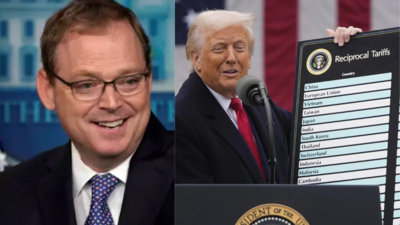Trump Administration Suggests Apple’s Relief from ‘Reciprocal’ Tariff Will Be Short-Lived
### The Changing Landscape of Tariffs: Essential Insights
In the past few months, the issue of tariffs has become more intricate, especially concerning the technology industry and its ramifications for both consumers and manufacturers. The recent actions taken by the Trump administration concerning tariffs on imports from China have sparked concern and created unpredictability, particularly for major tech players such as Apple.
#### Grasping the Current Tariff Context
On April 9, 2025, the Trump administration revealed a temporary reprieve from an eye-popping 125% reciprocal tariff on an array of tech products, which includes smartphones and laptops. This announcement was a welcome development for numerous consumers and enterprises, as it provided a fleeting break from possible price increases. Nevertheless, this reprieve isn’t a long-term solution; officials anticipate it will only be in place for “a month or two.”
Following this, the U.S. Customs and Border Protection agency released a list of exceptions to the new tariff, which featured crucial tech products like smartphones, laptops, hard drives, and memory chips. This action aimed to soften the immediate consequences for consumers and businesses that depend on these items.
#### The Fentanyl Tariff and Its Effects
Curiously, while many technological goods were spared from the 125% tariff, Apple and other corporations would still be subjected to a 20% “fentanyl tariff.” This additional fee, as pointed out by President Trump, would push the total tariff on Chinese imports to an astonishing 145% if both charges were enforced at the same time. Thankfully, the fentanyl tariff is presently the sole applicable fee, providing some respite for the tech sector.
Commerce Secretary Howard Lutnick has suggested that the tech industry will soon confront a “special focus type of tariff.” This upcoming tariff will specifically target items like the iPhone and other electronic devices, implying that the current relief may be short-lived. Trump has also noted that the administration will be reviewing the entire electronics supply chain, which could lead to further adjustments in tariff policies.
#### The Future of Manufacturing and Supply Chains
As the tariff scenario keeps evolving, numerous companies, including Apple, are likely to reconsider their manufacturing approaches. In response to the potential for heightened tariffs, Apple has started relocating a portion of its production to countries like India and Vietnam. New models, such as the M4 MacBook Air and M3 Ultra Mac Studio, have been produced in Vietnam, showcasing a strategic shift away from dependency on Chinese manufacturing.
Nonetheless, the practicality of entirely moving production outside of China remains questionable. The capabilities of manufacturing plants in other nations may not suffice to satisfy the demand for all Apple products sold in the U.S. This uncertainty adds yet another layer of complication to the ongoing tariff discussions.
#### Consumer Guidance: Take Action Now
In light of the current situation, consumers are urged to think about acquiring Apple products sooner rather than later. With new tariffs possibly on the horizon, prices could rise significantly in the near term. As indicated by Trump, no one will be “off the hook” from tariffs, making it wise for consumers to act before any potential price hikes come into effect.
#### Conclusion
The shifting tariff landscape poses both obstacles and prospects for consumers and producers alike. While temporary exemptions offer a brief respite, the future is unclear. As companies like Apple navigate these changes, consumers should remain vigilant and contemplate making purchases soon to evade possible price increases. The upcoming months will be crucial in determining the long-term effects of these tariff strategies on the tech sector and the wider economy.
Read More